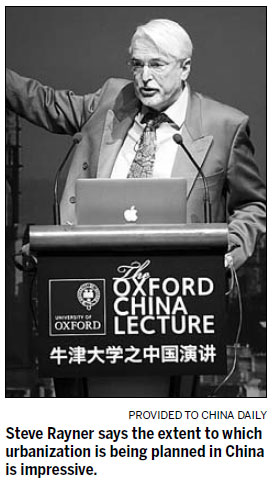 Large Medium Small
Large Medium Small
Steve Rayner has a China dream. In this dream he sees cities with clear blue skies and roads that are totally free of private cars.
Rayner, a James Martin professor of Science and Civilization at Oxford University's School of Anthropology and Museum Ethnography, advocates ridding China's roads of private cars as a way of solving the problem of congestion that dogs many Chinese cities.
"I think one of the things that China can take the lead on is taking all private cars off the road and developing driverless cars, which are computer-controlled electric vehicles constantly on the streets," says Rayner, who is also director of the Institute for Science, Innovation and Society at Oxford.
He was in Shanghai on Dec 10 to deliver the inaugural Oxford China Lecture.
If you want to go from your home to a railway station, he says, you pick up the mobile phone and just say "three people to the railway station" and the computer will program these vehicles to stop to pick you up.
"So there'll be no parking and we can free up all the space we currently use for parking for more productive economic and social activities. Car accident rates will be reduced because computer-operated cars don't have accidents, and congestion will be much less because the progress of the vehicles will be determined by the computerization, which means you will have a continuous traffic flow."
As outlandish as it all may sound, we must have some kind of vision that is radically different from choking up the city with private cars, he says.

Urbanization presents challenges and opportunities for China as the country is in the forefront of the global trend that 75 percent of its people will live in cities by 2050, Rayner says.
The extent to which urbanization is being planned in China is impressive, he says.
"It's an explicit policy goal, and urbanization in Europe and North America was not a planned process in the same way."
Cities just grew out of the patterns of industrial development in Europe and of migration and settlement in the United States, he says.
It is common for people to focus on social and environmental problems such as pollution, consumption and accident rates in cities, he says. But in fact a person living in the city has less of an impact on the natural environment than does someone living in the country. That is because those who live in cities travel less, use less energy and have better access to health services.
Cities could potentially be very good for nature as well, Rayner says.
"By concentrating people in high, dense settlements in the city, we can free up land in the countryside for natural processes and for ecosystem services. So I think urbanization is an excellent thing even though there are obviously problems."
Rayner arrived in Shanghai on Dec 6 when the air pollution there was dreadful, with the concentration of PM2.5 surpassing 600 micrograms a cubic meter, deemed hazardous by the Shanghai Environmental Monitoring Center.
"If you look at London, which decided to clean up the air in the 1960s, after 150 years of industrialization, it spent 30 years improving the air quality tremendously. So Shanghai, which has had a comparable process of urbanization happening for 30 years, could perhaps resolve the problem of air quality in 10 years."
That will depend on developing and implementing appropriate technologies, he says.
zhouwenting@chinadaily.com.cn
(China Daily 01/12/2014 page5)